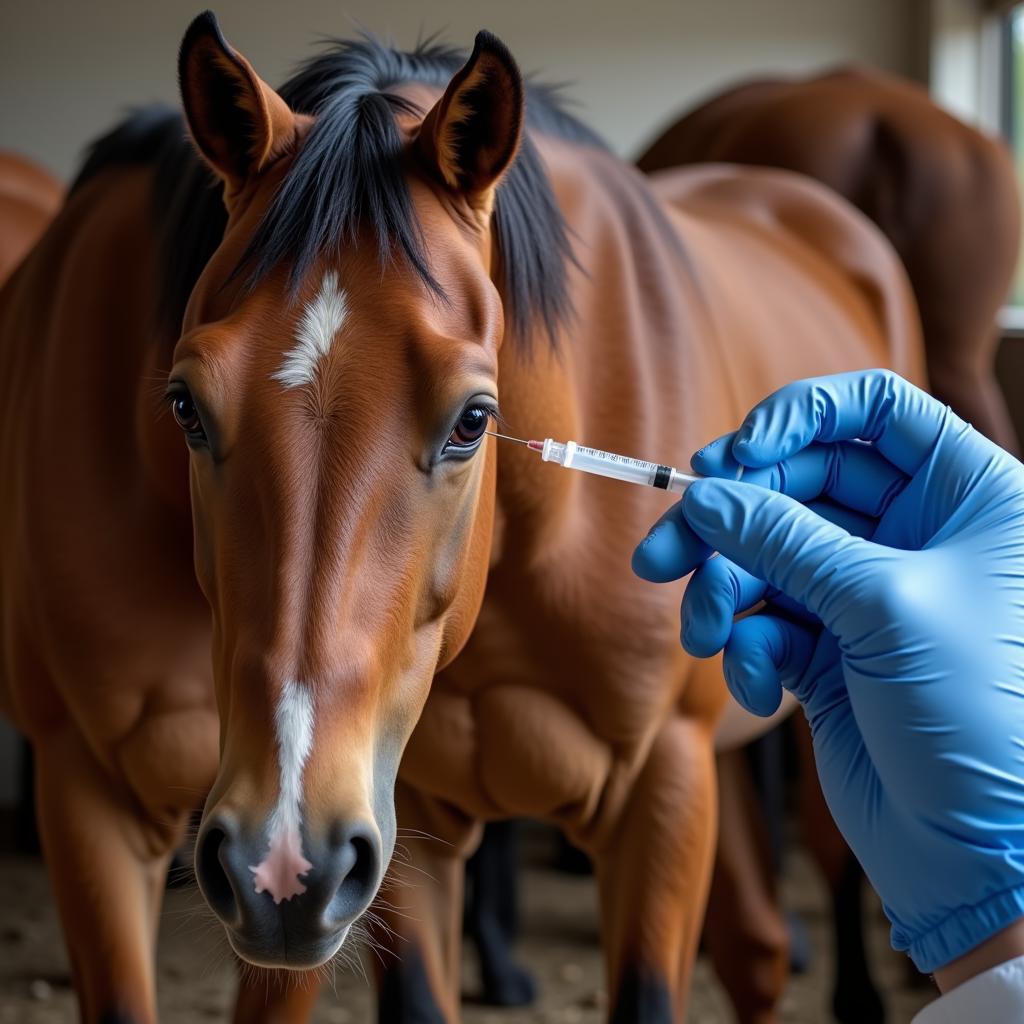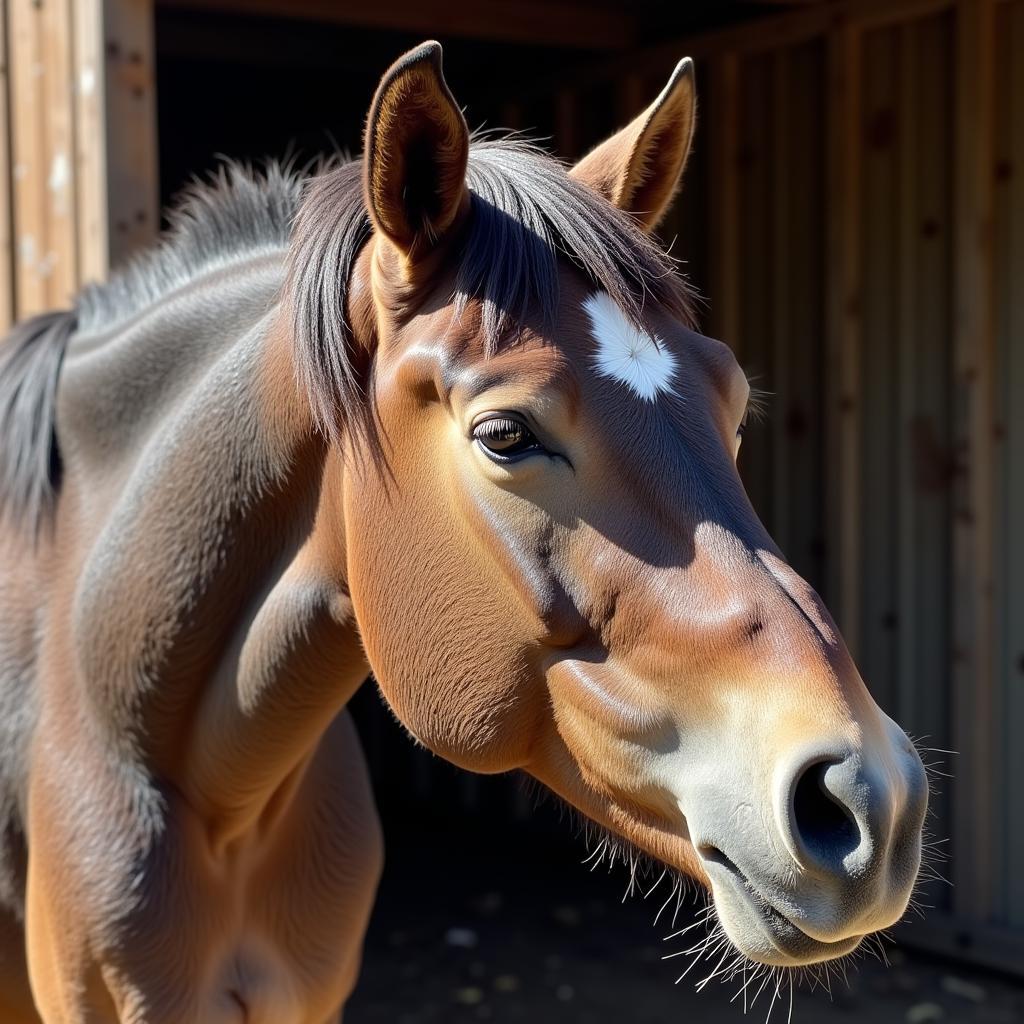B complex vitamins are essential for a horse’s overall well-being, playing a crucial role in energy production, nerve function, and red blood cell formation. Understanding the importance of B Complex For Horses is vital for any owner committed to their animal’s optimal health and performance. Just like humans, horses cannot produce sufficient quantities of these essential nutrients and require dietary supplementation.
Understanding the Importance of B Complex Vitamins
B complex isn’t a single vitamin, but a group of eight essential nutrients: B1 (thiamine), B2 (riboflavin), B3 (niacin), B5 (pantothenic acid), B6 (pyridoxine), B7 (biotin), B9 (folate), and B12 (cobalamin). Each plays a unique role, yet they work synergistically to support vital bodily functions. For example, B1 is crucial for carbohydrate metabolism, while B12 is essential for nerve function and red blood cell production. A deficiency in any of these vitamins can lead to a range of health problems, impacting everything from a horse’s coat condition to its athletic performance. Providing adequate B complex vitamins ensures that your horse has the necessary building blocks for a healthy and active life. This is especially true for horses under stress, such as those in training, competition, or recovering from illness. Are you ensuring your horse receives the B vitamins they need?
After this informative section, it’s beneficial to consider the connection between prebiotics and a horse’s digestive health. Check out our article on prebiotics for horses.
 Horse Receiving B Complex Injection
Horse Receiving B Complex Injection
Signs of B Complex Deficiency in Horses
Recognizing the signs of a B complex deficiency is crucial for early intervention and preventing more serious health issues. Common symptoms include lethargy, loss of appetite, poor coat condition, and decreased performance. More severe deficiencies can lead to neurological problems like muscle weakness, incoordination, and even seizures. If you notice any of these signs, it’s important to consult a veterinarian to determine the underlying cause and develop an appropriate treatment plan. Early detection and treatment are key to restoring your horse’s health and well-being.
Common Symptoms of Deficiency
- Lethargy and fatigue
- Decreased appetite
- Dull, dry coat
- Weight loss
- Neurological problems (muscle weakness, incoordination)
What are the early warning signs of a B vitamin deficiency in horses? The early signs can be subtle, such as lethargy and a dull coat.
 Horse with Dull Coat due to B Complex Deficiency
Horse with Dull Coat due to B Complex Deficiency
Sources of B Complex for Horses
While forage provides some B vitamins, it often isn’t enough, especially for performance horses. Supplementation is frequently necessary to ensure optimal levels. B complex for horses is available in various forms, including injectable, oral pastes, powders, and fortified feeds. The best method will depend on your horse’s individual needs and your veterinarian’s recommendations.
Different Supplement Forms and Their Benefits
- Injectable: Offers rapid absorption and is often used for treating acute deficiencies.
- Oral: Convenient for daily supplementation and comes in various palatable forms.
- Fortified Feeds: Provides a consistent source of B vitamins as part of the horse’s regular diet.
Which form of B complex is best for horses? The ideal form depends on individual needs; injectables work quickly, while oral supplements are convenient for daily use.
Looking for information on horses and tack? Visit our page on horses with tack.
Determining the Right Dosage
The correct dosage of B complex will depend on your horse’s age, weight, activity level, and specific needs. Always follow your veterinarian’s instructions and the product label guidelines. Over-supplementation can be harmful, so avoid exceeding the recommended dosage.
Consulting with a Veterinarian
It’s crucial to consult with your veterinarian before starting any new supplement regimen. They can assess your horse’s individual needs and recommend the appropriate type and dosage of B complex. They can also help rule out other underlying health conditions that may be causing similar symptoms.
“Proper nutrition is the cornerstone of equine health. B complex vitamins are crucial for supporting various bodily functions, especially in performance horses,” says Dr. Amelia Carter, Equine Veterinarian.
Have you ever seen a bull and a horse together? Learn more about the interesting relationship between these two animals on our dedicated bull and horse page.
Conclusion
B complex vitamins are essential for maintaining your horse’s overall health, energy levels, and performance. Understanding the signs of deficiency and working with your veterinarian to establish a suitable supplementation plan is crucial for ensuring your equine companion thrives. By providing the right nutrients, you’re investing in your horse’s long-term well-being.
FAQ
- What are the key benefits of B complex for horses? B complex supports energy production, nerve function, red blood cell formation, and overall health.
- Can I give my horse human B complex vitamins? No, always use equine-specific supplements formulated for their unique needs.
- How do I know if my horse has a B complex deficiency? Look for signs like lethargy, poor coat condition, loss of appetite, and decreased performance. Consult your vet for diagnosis.
- What are the different ways to supplement B complex? Injections, oral pastes, powders, and fortified feeds are common methods.
- Can I overdose my horse on B complex vitamins? Yes, over-supplementation can be harmful. Always follow your veterinarian’s recommended dosage.
- What should I do if I suspect my horse has a B complex deficiency? Contact your veterinarian immediately for diagnosis and treatment recommendations.
- Are B complex vitamins essential for all horses? While all horses need B vitamins, performance horses and those under stress often require higher levels through supplementation.
For adjustable height options, visit our page on adjustable height saw horses.
“Ensuring your horse receives adequate B vitamins is a vital part of responsible horse ownership,” adds Dr. James Reynolds, Equine Nutritionist.
“Remember, a balanced diet combined with appropriate B complex supplementation can significantly impact your horse’s overall health and vitality,” reminds Dr. Carter. You should also check out our article on the benefits of probiotics horses.
Need help with your horse’s nutritional needs? Contact us! Phone: 0772127271, Email: [email protected] or visit us at QGM2+WX2, Vị Trung, Vị Thuỷ, Hậu Giang, Việt Nam. We have a 24/7 customer service team.